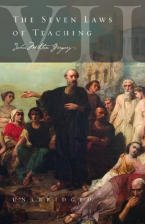Pompous Pretence and Solemn Platitudes
 We often think that a teacher is good if he uses really big words, and impresses us with his ability to teach on a given subject for longer than our attention can hold it. "Wow, he's really smart; I can hardly understand what he's talking about. He must be a great teacher." But if we think about this for a minute, we'll realize that we're coming to a backward conclusion. What does a good teacher do? He makes a difficult concept easy to understand; and if he wants us to remember what we have learned, he'll value the economy of words. John Milton Gregory puts it very well in his book, The Seven Laws of Learning:
We often think that a teacher is good if he uses really big words, and impresses us with his ability to teach on a given subject for longer than our attention can hold it. "Wow, he's really smart; I can hardly understand what he's talking about. He must be a great teacher." But if we think about this for a minute, we'll realize that we're coming to a backward conclusion. What does a good teacher do? He makes a difficult concept easy to understand; and if he wants us to remember what we have learned, he'll value the economy of words. John Milton Gregory puts it very well in his book, The Seven Laws of Learning:"There is a meaner, if not also more mischievous, wrong done by the teacher who seeks to conceal his lazy ignorance by some pompous pretence of learning, hiding his lack of knowledge by an array of high-sounding words beyond the comprehension of his pupils, uttering solemn platitudes in a wise tone, or claiming extensive study and profound information which he has not the time to lay properly before them. Who has not seen or heard all these shams practiced upon children" (45)?


4 Comments:
Hey Tamber, great to hear from you!
Here's the closest quote I could find in Gregory's book to the point you have made:
"Others look hastily through the lesson, and conclude that though they have not mastered it, nor perhaps one thought in it, they have gathered enough to fill the brief hour, and they can, if needful, eke out the little they know with random talk or story. Or, lacking time or heart for any preparation, they carelessly dismiss all thought of teaching, fill the hour with such excercises as may occur to them, and hope that, as the Sunday school is a good thing, the children will get some good from mere attendance" (45).
It's interesting, it seems that back in 1886 when the book was published, entertainment as a tool in education was not even considered to be in the realm of possibilities! Hmm...
Great point.
Who has not seen or heard all these shams practiced upon Adults?
Also, using unnecessarily complex language often intimidates the audience into silence. May our blogs not fall into that trap. :)
Vijay,
I concur with your summation of the proclivity of blogdom to pontificate utilizing non-vernacular terminology which has a propensity to obfuscate rather than elucidate the intellect of its patrons.
Yes, and to which is known to be the epitome of eschatology, in its sense of epistemology, but not to be confused with its vernacular freedom.
Post a Comment
<< Home